Detailed Explain: What are Prepaid Phones? Airvoice Wireless 2024
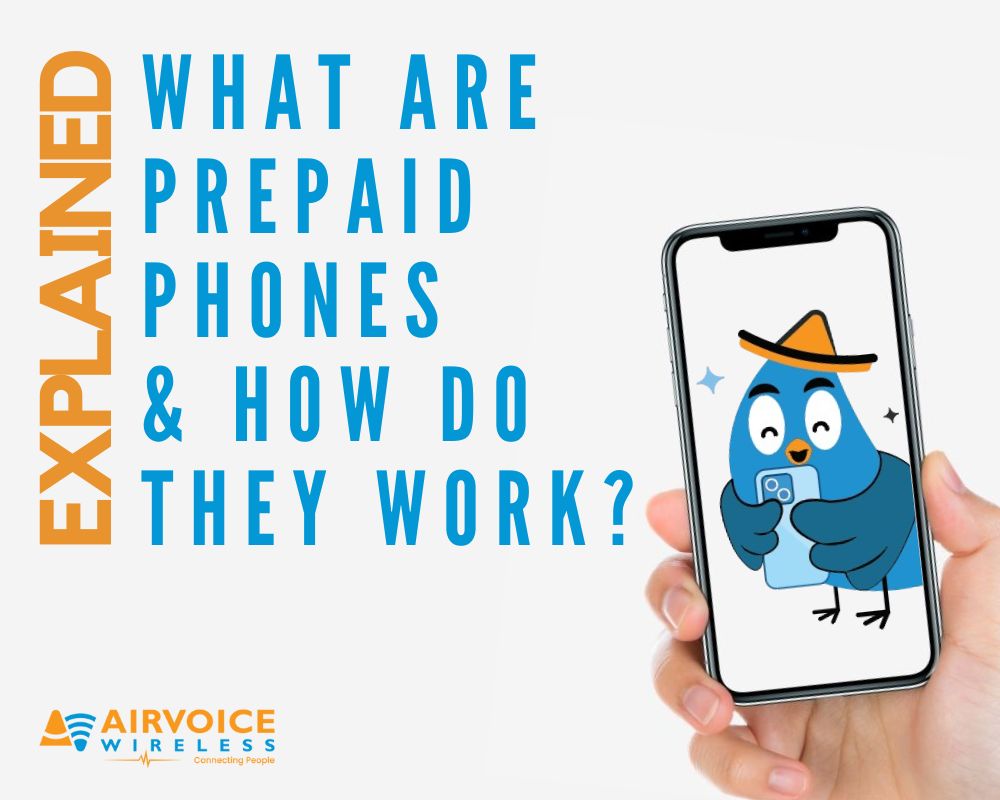
Understanding Prepaid Phones: A Definition and Key Features
Prepaid phones are essentially mobile devices that come with a pay-as-you-go arrangement. This means you, the user, pay for your talk time, text messages, and data upfront, rather than receiving a monthly bill based on your consumption. Such plans bestow upon you the gift of financial predictability, as they eliminate the worry of exceeding usage limits and incurring additional charges.
Key Features:
- No contracts: Users pay month-to-month.
- Flexibility: Customize plans based on usage.
- Spending Control: Pay in advance, no surprises.
- No credit checks: Accessible to all.
- No overages: No charges for exceeding limits.
- No activation fees: Affordable to start.
- Device variety: From basic to high-end smartphones.
- International roaming: Convenient for travelers.
- Privacy: No personal or credit info required.
- No cancellation fees: Cancel anytime hassle-free.
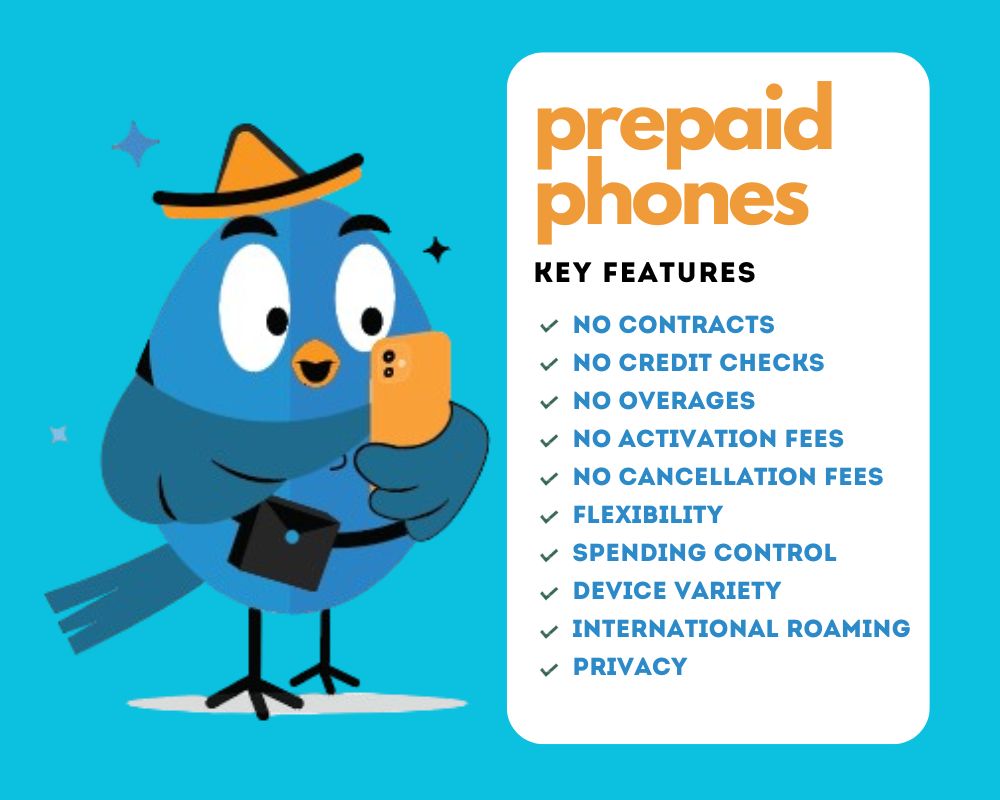
How Prepaid Plans Differ from Traditional Postpaid Contracts
Prepaid phone plans stand in stark contrast to traditional postpaid phones in quite a few ways. With a prepaid plan, they are relieved of monthly bills. Instead, they pay upfront for a specific amount of service and refill as needed. This eliminates the common contractual obligations such as early termination fees or penalties for changing service providers. Flexibility is a major perk—when their needs change, they can easily switch plans or providers without hassle. Traditional contracts usually come with a fixed monthly fee, which may include a certain amount of minutes, texts, and data. They might also require a credit check and have a fixed term length, sometimes locking users into a 1- or 2-year agreement. While some users appreciate the predictability and potential for unlimited use plans, others find the prepaid model more conducive to their lifestyles because of its pay-as-you-go structure. This breakdown should give you a clear understanding of the main differences between prepaid plans and traditional contract-based plans.
| Aspect | Prepaid Plans | Traditional Contracts |
| Payment Structure | Pay in advance for usage (top-ups) | Pay monthly for a set service package |
| Contract Commitment | No long-term contracts required | Typically involves 1-2 year contracts |
| Credit Checks | Usually no credit checks required | Often require credit checks |
| Flexibility | Easily switch carriers or plan bundles | Limited flexibility during contract |
| Cost Control | Control spending by purchasing specific amounts of credit | Fixed monthly bills regardless of usage |
| Extras and Discounts | Fewer perks and discounts often available | More extras like subsidized phones and loyalty rewards |
| Coverage and Network | May have access to same networks as contract plans, but sometimes with limitations | Full access to network without restrictions |
| Upfront Costs | Pay upfront for device (if purchasing) | Often subsidized or included in monthly payments |
| Early Termination Fees | None, as there’s no contract | Typically incurred if contract is ended early |
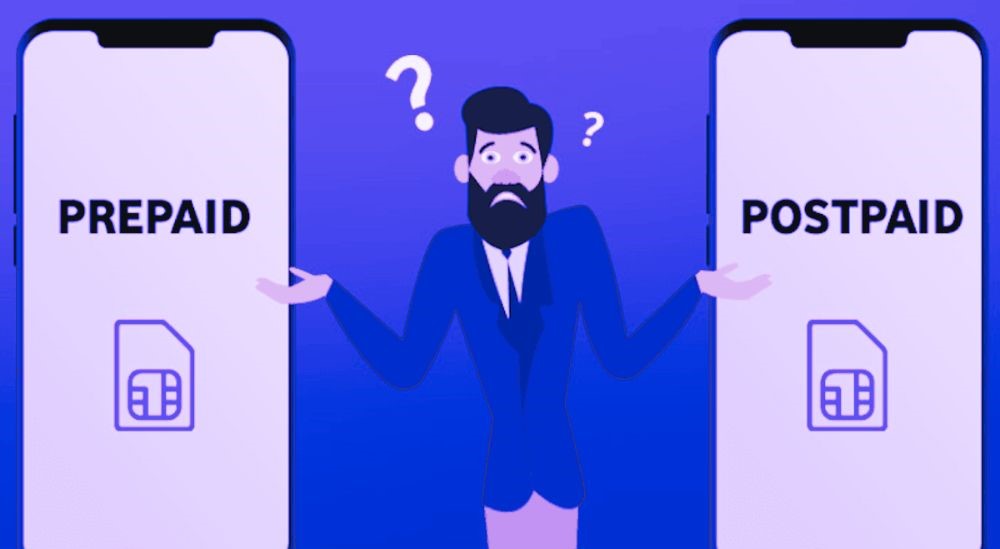
How Does a Prepaid Phone Work?
Purchasing a Prepaid Phone
Buying a prepaid phone is a straightforward process. You have the latitude to select from a variety of devices, ranging from basic mobile phones to the latest iPhone and Android devices. These can be procured from various sources, namely phone retailers, department stores like Walmart, and even directly from many network providers in-store or online on their website.
>> Read more:Choosing a Phone: Burner Cell vs Prepaid Cell Differences
Steps to Purchasing a Prepaid Phone:
- Select a Phone: Choose a device that aligns with your needs, whether it be a simple flip phone or a high-caliber smartphone.
- Choose a Carrier: Opt for a network provider that offers optimal coverage in your region and resonates with your budgetary constraints.
- Select a Plan: You will need to purchase a starter pack or sim kit, which typically includes some combination of talk, text, and data.
- Activate your Plan: Understand how to activate your plan which can be done through your service provider.

Things to Remember:
- Compatibility: Ensure the phone is compatible with your preferred network carrier.
- Coverage Area: Check if the network covers where you need it.
- Cost Transparency: Understand all fees and charges upfront.
- Data Usage: Choose a plan with the right data for your needs.
- Refill Options: Know how to add funds to your account.
- Device Warranty and Support: Check device warranty and support options.
- International Use: Ensure compatibility and understand roaming rates.
- Upgrade Path: Consider future options for plan or device upgrades.
Types of Prepaid Phone Plans
Prepaid phone plans come in a myriad of configurations to suit diverse consumer needs and preferences. The objective is to offer you a tailored experience, allowing you to pay only for the services you actually use, all without the long-term commitments of a contract. Each plan is structured differently, accommodating a wide range of scenarios, from minimalistic users who keep phones for emergencies to heavy data consumers who stream and surf on the go. Understanding the specifics of each plan option ensures that you settle for a package that aligns seamlessly with both your communication needs and your budget.
Read more: Simplified: How Do Prepaid Cell Phones Work?
- Pay-As-You-Go: Charges based on usage, with no fixed monthly subscription.
- Monthly Plans: Offers a set amount of minutes, texts, and data for a fixed monthly fee.
- Unlimited Plans: Provides unlimited usage of talk, text, and data for a flat monthly rate.
- Daily or Weekly Plans: Offers usage for a specific duration, usually days or weeks for a fixed fee.
- Data Only Plans: Focuses solely on providing data for devices like tablets or mobile hotspots.
- International Plans: Includes features for making calls or using data abroad, often with additional fees.
Pros and Cons of Using Prepaid Phones
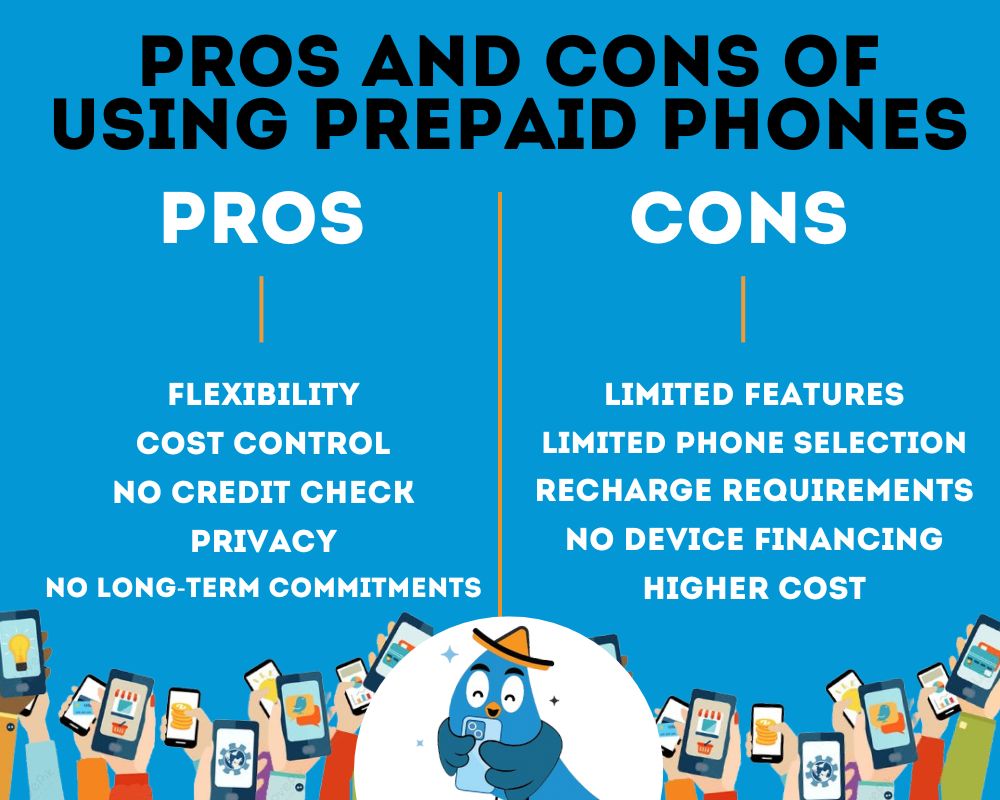
Advantages
Prepaid phone plans have several compelling advantages that cater to the desire for simplicity and financial control in mobile services. These benefits make prepaid phones a fitting choice for many, from students and budget-conscious individuals to those who appreciate the ability to manage their expenses actively.
- Flexibility: Prepaid plans often offer more flexibility in terms of commitment. You can switch plans or carriers more easily without the constraints of a contract.
- Cost Control: With prepaid plans, you pay for what you use upfront, so there are no surprises at the end of the month. This can help you budget more effectively and avoid unexpected charges.
- No Credit Check: Since prepaid plans don’t require a contract, they typically don’t require a credit check, making them accessible to people with varying financial backgrounds.
- No Long-Term Commitments: You’re not tied to a long-term contract, so you can cancel or change your plan at any time without penalties.
- Privacy: Prepaid phones can offer a level of privacy since they don’t require personal information like a contract plan might. This can be appealing to those concerned about data privacy.
Disadvantages
Despite the conveniences, prepaid phones are not without their drawbacks. While they offer financial control and flexibility, they may come with certain constraints that might influence your decision. Understanding these limitations is crucial as you weigh the pros and cons of entering into a prepaid plan. Being informed will ensure that you make a choice that is in tune with your communication needs and lifestyle.
- Higher Per-Minute or Per-Data Costs: Prepaid plans often have higher per-minute or per-data costs compared to contract plans, making them less cost-effective for heavy users.
- Limited Features: Some prepaid plans may have limitations on features or network access compared to contract plans. This can include slower data speeds or fewer bonuses like international roaming.
- Limited Phone Selection: Prepaid plans may offer a more limited selection of phones compared to contract plans, and you may need to purchase a phone outright rather than getting it subsidized through a contract.
- Recharge Requirements: You need to stay on top of recharging your account to ensure you have enough credit to make calls, send texts, or use data. Forgetting to recharge could leave you without service until you top up again.
- No Device Financing: Unlike contract plans that often offer device financing options, prepaid plans typically require you to purchase the phone outright, which can be a significant upfront cost.
Who Can Benefit from Prepaid Phones?
Target Demographics: Students, Travelers, and Budget-Conscious Users
Prepaid phones particularly resonate with certain demographics who value the associated flexibility, simplicity, and cost management. These target groups often find that prepaid plans align well with their transient, budget-restricted, or streamlined communication requirements.
- Students: Juggling academics and often tight budgets, students can take advantage of prepaid phones to stay connected without the worry of monthly bills. The no-contract aspect is particularly beneficial for students who may need to alter or pause their plans according to academic schedules.
- Travelers: Those who travel frequently appreciate the ability to swap SIM cards or choose short-term international plans without the constraints of a contract. Prepaid phones offer an economical and adaptable way to stay in touch when hopping from one locale to another.
- Budget-Conscious Users: For individuals and families prioritizing budget management, prepaid phones provide a straightforward way to monitor and control mobile expenses. There’s no risk of incurring overage fees, as users can only use the services they have already paid for.
Scenario Analysis: Ideal Situations for Prepaid Phone Usage
Certain scenarios make the case for prepaid phone usage particularly compelling, offering a blend of cost efficiency, convenience, and control. In each of these situations, the flexibility and financial control offered by prepaid phones align perfectly with the short-term or specific nature of the user’s needs, making it an ideal solution.
- Emergencies and Infrequent Use: For those who primarily need a phone for emergencies or rare occasions, a prepaid phone is an economical choice. This ensures that you only pay for what you use without the pressures of a monthly fee.
- Short-Term Replacement: If your main device is lost or being repaired, a prepaid phone can fill the gap without requiring you to lock into a new contract.
- Parental Control: Parents considering a first phone for their children may opt for a prepaid plan to teach responsibility and limit usage. It offers a straightforward method to control costs and monitor phone usage.
- Testing New Services: Before committing to a new carrier or service, using a prepaid phone can be a strategic move to assess network coverage and customer service quality.
Factors to Consider When Choosing a Prepaid Phone Plan
Assessing Your Mobile Needs: Usage Patterns and Budget Considerations
Before diving into a prepaid phone plan, it’s critical to assess your individual mobile needs carefully. This includes analyzing your usage patterns and budgetary constraints to find the most suitable plan. By quantifying your mobile usage and financial parameters, you can pinpoint a prepaid plan that delivers on value, performance, and affordability.
Evaluating Usage Patterns:
- Determine Your Call and Text Frequency: Keep tabs on how often you make calls or send texts to gauge the volume of service you require.
- Understand Your Data Consumption: Consider your habitual data usage for social media, streaming, navigation, and other apps. This will inform the size of the data package you’ll need. Understanding your consumption will keep you from exceeding your data limit.
- Identify Peak Usage Times: Some plans offer different rates at peak and off-peak times. Ensure your plan aligns with when you’re most likely to use your phone.
Considering Budgetary Limitations:
- Establish a Budget: Determine your maximum monthly spend for mobile services and find a plan that fits within it.
- Cost-Effectiveness: Compare the cost per unit of talk time, text messages, and data within prepaid plans to the typical usage costs of postpaid plans.
- Long-Term Savings: While prepaid plans can have higher per-unit costs, they might still offer savings by preventing overage charges and not requiring a long-term commitment.
Comparing Features and Coverage among Providers
Selecting the right prepaid mobile operator involves an in-depth comparison of the features and coverage they offer. Your goal is to secure a plan that not only meets your mobile needs but also delivers reliable service wherever you use your phone most frequently. By scrupulously comparing these elements, you’ll be more equipped to choose a provider that offers the best balance of cost, coverage, and convenience, ensuring a satisfactory prepaid phone experience.
Key Aspects to Compare:
- Coverage Area: Check network coverage where you live, work, and travel.
- Data Speeds: Look for fast and consistent data for tasks like streaming.
- Plan Flexibility: Consider ease of plan changes and extras like rollover credits.
- Additional Benefits: Assess perks like international calling or hotspot data.
- Customer Service: Research reputation for reliable support and assistance.
For those seeking affordable prepaid plans with reliable coverage and additional benefits, consider Airvoice Wireless as your mobile phone operator. With a diverse range of options catering to various needs and budgets, Airvoice offers flexibility without locking customers into long-term contracts. Leveraging the extensive coverage of the AT&T network, Airvoice ensures reliable connectivity nationwide. Easy activation processes and additional features like international calling and mobile hotspot usage further enhance the appeal of Airvoice Wireless plans.
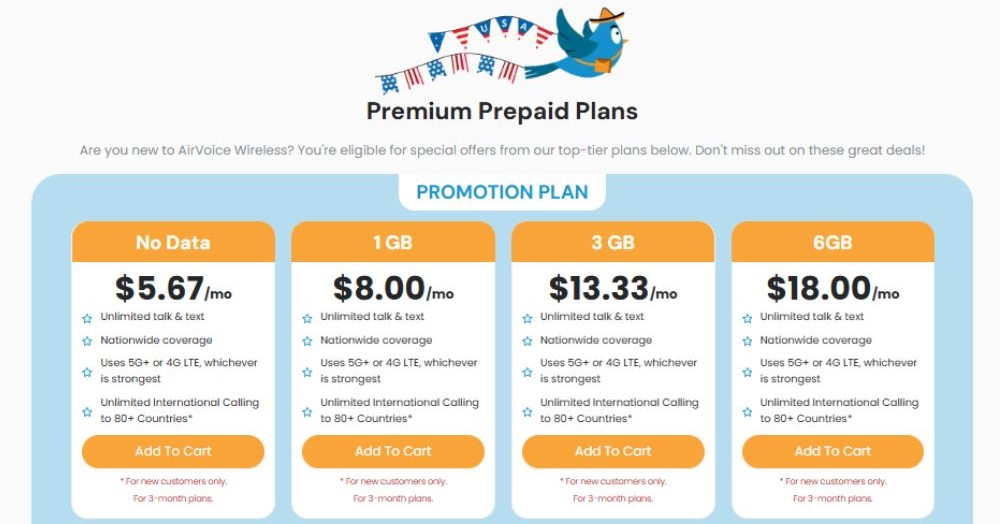
FAQ: Frequently Asked Questions about Prepaid Phones
What Are the Advantages of Going Prepaid Rather Than Postpaid?
The advantages of opting for a prepaid phone plan over a postpaid one vary depending on your personal or financial circumstances, but they typically include a mix of increased control, flexibility, and potential cost savings.
- Financial Flexibility: You pay for exactly what you need, when you need it. There are no surprises at the end of the month with overage charges.
- No Credit Checks: Prepaid plans are ideal for those who want to avoid credit checks due to poor or unestablished credit history.
- No Long-Term Commitment: You’re not locked into a contract, giving you the freedom to switch carriers or plans without facing early termination fees.
- Control Over Costs: By not allowing services beyond what you’ve paid for, prepaid plans help you manage your budget effectively and avoid debt.
- Customization: Prepaid allows you to customize your plan more freely with the ability to scale up or down services every month based on your actual usage.
These benefits make prepaid a practical alternative to postpaid, particularly for people who prioritize straightforward billing and have adaptable or unpredictable mobile usage patterns.
How Do You Add Credit to a Prepaid Phone?
Adding credit to a prepaid phone is a simple process that can be completed through various methods to best suit your convenience:
- Direct Top-Up Through Carrier: Many mobile networks offer direct top-up services on their websites, apps, or by calling their customer service. You can use a credit/debit card or other electronic payment methods to add funds.
- Prepaid Cards: Purchase a prepaid card from retail stores or the carrier’s outlets, which will have a code that you can enter into your phone or online to redeem credit.
- Automatic Payments: Set up automatic payments with your carrier to add credit regularly or when your balance falls below a certain threshold.
- Online Retailers: Some third-party online services also sell prepaid top-up codes which you can purchase and redeem as needed.
Regardless of the method chosen, you’ll receive confirmation of your new balance, ensuring you can manage your spending and stay connected.
Can Prepaid Phones Be Used Internationally or Only Locally?
Prepaid phones can be used internationally, although how they are used and the associated costs can vary significantly compared to local usage. When traveling abroad, you have a few options:
- International Roaming Add-Ons: Some prepaid plans offer international roaming packages that you can purchase before traveling.
- Local SIM Cards: Often, it’s more cost-effective to buy a local prepaid SIM card in the country you’re visiting, assuming your phone is unlocked and compatible with the local networks.
- Special International Prepaid Phones: There are prepaid phones designed specifically for international use, with features catering to travelers, such as the ability to use multiple SIM cards or automatic conversions to local networks.
It’s essential to research the roaming rates and the compatibility of your prepaid phone with international networks before embarking on your travels to avoid unexpected charges and ensure connectivity.
What Happens if I Don’t Refill My Prepaid Account On Time?
Failing to refill your prepaid account on time could lead to a temporary suspension of your services. Here’s what generally happens:
- Service Disruption: If your balance reaches zero or you don’t purchase additional credit before your existing credit expires, your ability to make calls, send texts, or use data will be suspended.
- Maintained Account: Often, the carrier will maintain your account in a suspended state for a certain period, allowing you to revive it by adding funds.
- Number Retention: Typically, you can retain your phone number if you refill within this grace period.
- Permanent Deactivation: If you don’t add credit within the carrier’s specified timeframe, your account may be closed permanently, and your phone number could be reassigned to a new customer.
It’s crucial to be aware of your service end date or data allowances to ensure uninterrupted service, especially since many rely on their phones for critical communication.






